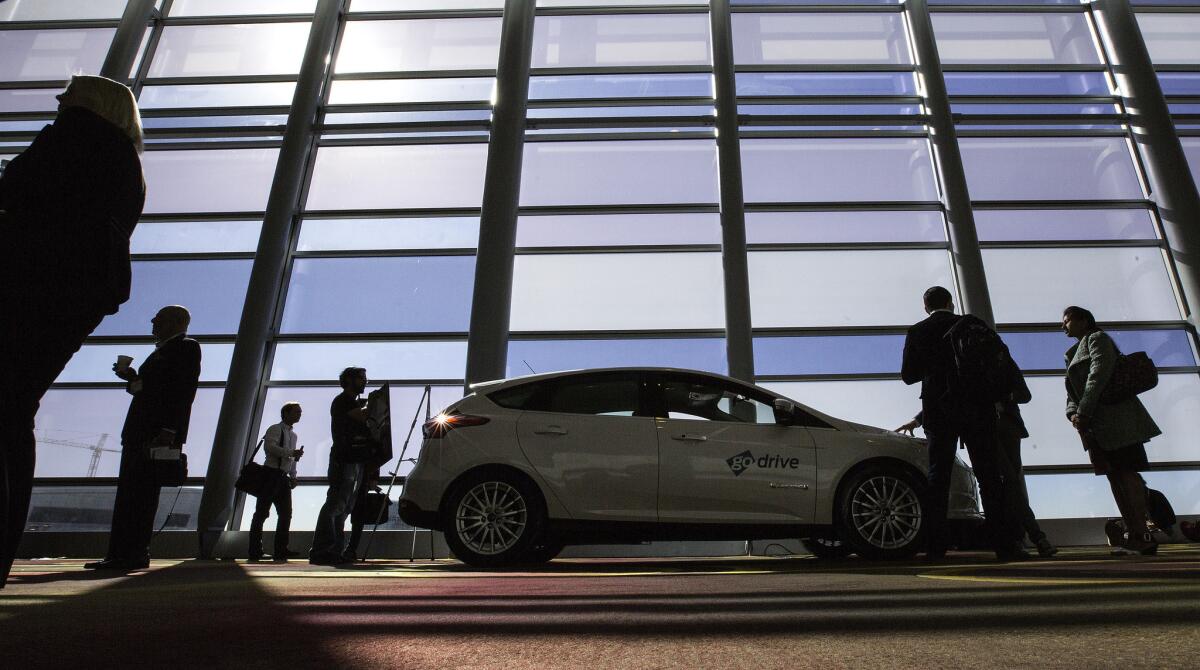The future of autos: fewer humans at the wheel

Ford’s Focus Electric gets a few looks at the Connected Car Expo at the JW Marriott in Los Angeles on Tuesday. After three media and trade days, the L.A. Auto Show opens to the public Friday through Nov. 29.
In the not-so-far-off future, teens won’t bother getting driver’s licenses, consumers will shun owning their own cars, and taxis will be replaced by “taxibots.”
That’s the world described by speakers on the first day of the Los Angeles Auto Show, which was devoted to the connected car. The two-week convention in recent years has shifted its focus away from the latest car models to the newest tech innovations transforming vehicles from the inside.
After three media and trade days, the L.A. Auto Show opens to the public Friday through Nov. 29.
UPDATES: Get live updates from the floor of the L.A. Auto Show
Car ownership takes a back seat
Here’s a 16th-birthday present John Zimmer’s daughter won’t be getting: a car.
Lyft’s co-founder and president shared that parenting tidbit Tuesday during his keynote address.
“It’s not because I’m cheap,” Zimmer said. “It’s because she won’t want to own one. And by then she won’t need to.”
He also revealed he won’t even teach her how to drive, saying he’s so confident in the ride-sharing revolution being led by ride-hailing apps that he predicts it will end car ownership “as we know it.”
Zimmer noted that the average U.S. household uses its cars only 4% of the time and that only 20% of seats are occupied. In L.A., commuters spend more than 250 hours a year in traffic.
“Simply put, owning a car today is not enjoyable,” he said. “Roads and parking lots have paved 60% of Los Angeles, and this is the same pattern happening all over the world, where we are literally paving paradise.... Our cities don’t need to and shouldn’t be this way.”
Zimmer predicted that millennials, who are more focused on experiences such as travel, food and friends over cars, will help usher in a “massive shift” away from car ownership. Less than 70% of 16- to 24-year-olds have a driver’s license.
“This is the new transportation consumer,” he said in front of an audience of reporters and industry professionals at the JW Marriott hotel. “They’re telling us the days of traditional car ownership are over.... This trend will continue to accelerate rapidly.”
With ride-sharing options such as Lyft, which had more than 7 million rides in October, Zimmer said consumers are getting back some of their freedom and that traffic congestion will subsequently lessen.
He then outlined an ambitious goal to rebuild cities that would include the removal of parking garages, parking lots and even “some stretches of freeway” in order to make room for parks and businesses.
Taxibots to transform L.A.
The taxibots are coming.
Eric Spiegelman, president of the Los Angeles Taxicab Commission, said Angelenos will one day be able to hail driverless taxis. The autonomous vehicles will be able to get people from place to place while lowering costs drastically, he said.
“Driverless cars have the potential to solve certain intractable social inequity problems,” he said.
For one, fares will decrease 85%, to about 25 cents a mile, he predicted. That means for most people, there will be no need to own a car.
“That’s not just competitive with taxicabs — that’s competitive with private car ownership,” he said. “At 25 cents a mile, that’s competitive with a city bus. Any trip less than 7 miles is cheaper than a city bus.”
Spiegelman said the new transportation method would be less than half the cost of owning the most popular car in America, and he believes that in 20 years, L.A. will be filled with taxi robots.
With the price so low, people from all socioeconomic backgrounds would be able to afford riding in a taxibot, which will mean more equality for anyone who wants a ride. As it is now, he said, ride-sharing services are less available in lower-income neighborhoods because drivers can pick and choose where they want to operate.
“Taxibots are probably not going to be racist,” he said.
The vehicles will also be free of the constraints of today’s taxis — robots, for instance, don’t need sleep. Spiegelman said the commission starts worrying when its drivers log more than 50,000 miles of driving a year, but taxibots can do 100,000 miles a year.
If his lofty predictions come true, it could be great for customers.
Not so much for taxi drivers.
PHOTOS: See the best of the L.A. Auto Show
More challenges for driverless cars
Driverless cars are poised to become the vehicles of the near future, but there is still a long way to go when it comes to safety, reliability and policy.
That was the takeaway from one of the first sessions at the auto show, in which executives from tech companies and carmakers praised and lamented the issues surrounding autonomous cars.
Although the cars have performed well in sunny weather, they still need to prove themselves in hazardous conditions. Sensor ranges need to increase so the vehicles can perform long-range scanning, and cameras have to be able to detect diverse lane markings and signage. Carmakers need to have serious conversations about what will happen when driverless cars get into accidents.
And even after autonomous cars become mainstream, there are some people who say there will still be a need for competent human drivers.
“You have to consider the driver is the top of the pyramid,” said Gary O’Brien, global director of advanced engineering at Delphi. “People are going to be much better than any algorithm we develop and code into a computer.”
Twitter: @byandreachang
ALSO
In detail: The cars of the 2015 L.A. Auto Show







